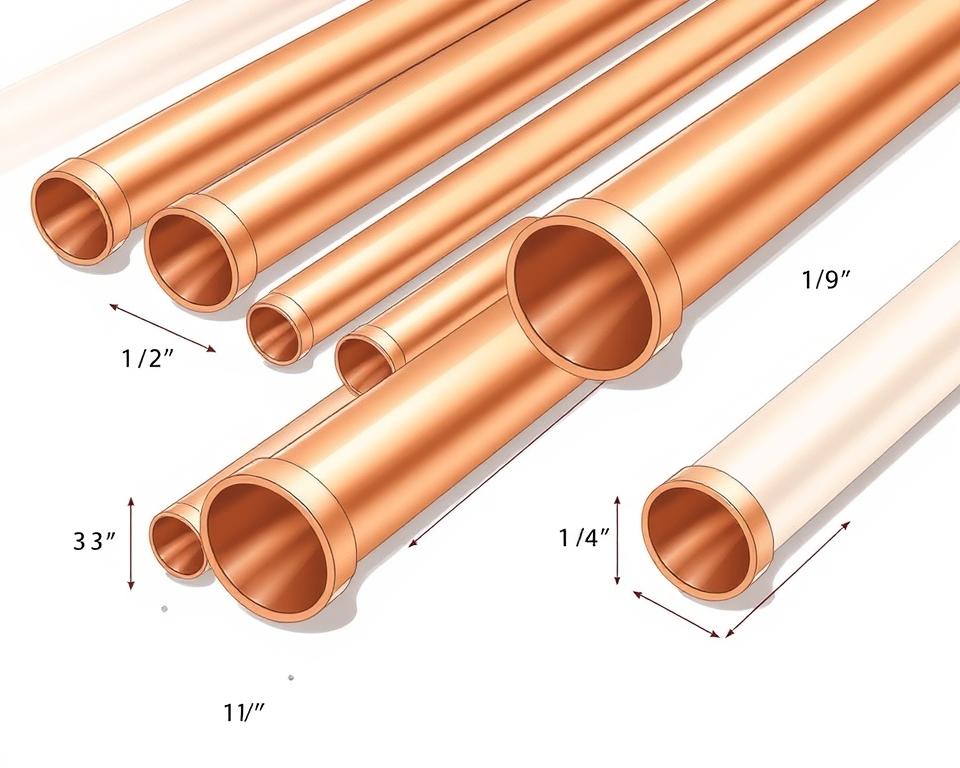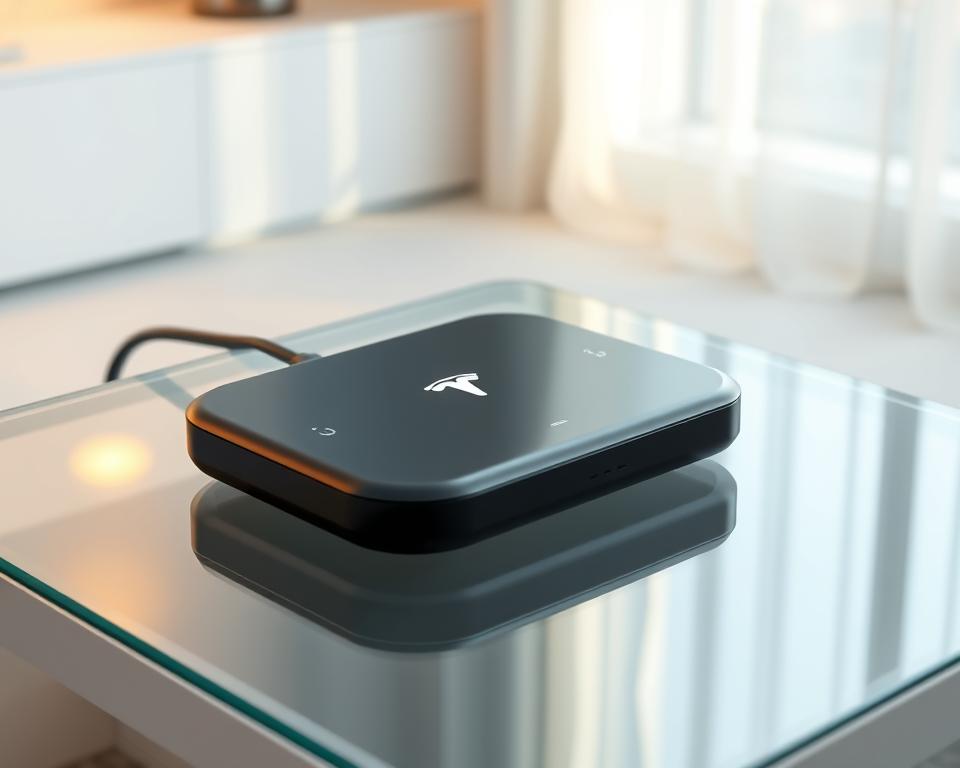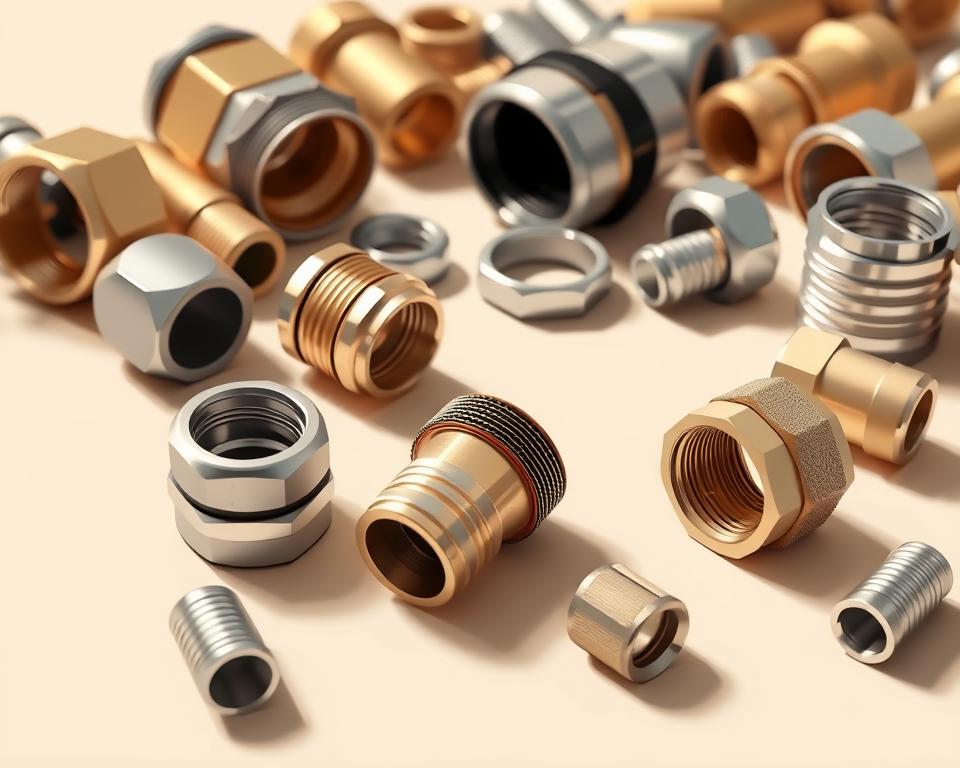Understanding Copper Pipe Sizes for Residential Water Lines
Did you know that nearly 30% of home plumbing issues stem from incorrectly sized piping? Choosing the right dimensions ensures optimal water pressure and system efficiency. Here’s a homeowner’s primer on the sizing essentials for residential water projects.
Proper sizing depends on factors like flow requirements and wall thickness. The industry standard 5/8 copper fittings ranges from 1/4″ to 8″ diameters, measured by NPS (Nominal Pipe Size) and actual outer dimensions. Installation Parts Supply offers expert guidance to match your home’s needs with compliant solutions.
Copper continues leading the pack because of its strength and ability to resist corrosion. Whether retrofitting your setup or installing from scratch, knowing these principles cuts downtime and avoids costly mishaps.
Critical Points

- Accurate sizing stops 30% of usual plumbing issues
- Standard diameters range from 1/4″ to 8″
- NPS labels don’t match real outer diameters
- Right sizing preserves water pressure and performance
- Copper offers durability and corrosion resistance
- Specialist support secures regulation adherence
Why Copper Pipes Are Ideal for Your Plumbing?
Plumbing longevity starts with selecting the right material—here’s why copper stands out. Its 50+ year lifespan and NSF certification for drinking water make it a top pick for homeowners. Unlike alternatives, it combines strength with sustainability.
Durability and Corrosion Resistance
Thanks to its innate corrosion resistance, copper outperforms PVC/PEX. Its smooth interior maintains water pressure by reducing friction. Field cases demonstrate leak-free decades-long service.
Installation Parts Supply carries certified quality products suited to your project. Although upfront costs rise, less frequent repairs yield savings over time.
Flexibility and Freeze Protection
In cold climates, copper’s slight expansion during freezing prevents bursts. This give lowers the likelihood of pricey cold-weather failures. Pair it with proper insulation for maximum freeze protection.
Sustainable and Germ-Fighting Properties
Being wholly recyclable, it cuts environmental burden. Antimicrobial action curbs bacterial proliferation to boost water purity. For eco-conscious homeowners, it’s a clear win over plastic alternatives.
Mastering Copper Water Line Measurements and Styles
Pipe sizing can baffle homeowners—this section clarifies it. Industry NPS labels don’t correspond to real outside measurements. As an instance, 1/2″ NPS measures 0.625″ across externally.
Labeled vs. True Pipe Sizes
Nominal sizes act as identifiers, not actual dimensions. Verify the OD itself when buying. Use this quick conversion guide:
- 1/4″ NPS = 0.375″ OD
- 1/2″ NPS = 0.625″ OD
- 3/4″ NPS corresponds to 0.875″ OD
Comparing Types L, M & K
Three copper variants lead in home plumbing. Use-case depends on each type’s wall thickness:
- Type L: Thin-wall (0.040″ @ 1/2″), suited for typical dwellings.
- Type M: Medium-wall (0.050″ for 1/2″), balances cost and durability.
- Type K: Heavy-wall (0.060″ for 1/2″), for high-pressure systems.
For versatility, Installation Parts Supply favors Type M in most setups. Over 2″ spans usually need Type K for irrigation or business applications.
Type L Copper: Lightweight and Flexible
DIY enthusiasts benefit from L-type’s superior bendability. Thin gauge lightens load and price yet stays robust. Comes both in straight bars and flexible coils for HVAC to DWV work.
L-Type Uses and Constraints
Best suited to systems under low pressure. With 0.040″ walls, it’s great for:
- HVAC refrigerant lines
- Drain-waste-vent (DWV) systems
- Residential water supply (below 80 PSI)
Avoid high-pressure systems—thicker-walled alternatives like Type K handle those better. Soft coils (up to 50ft) simplify bending around obstacles but require careful handling to prevent kinks.
Choosing and Installing L-Type Pipes
Sizes span 1/4″–8″, including:
| Form | Max Length | Best For |
|---|---|---|
| Rigid | 20ft | Straight runs |
| Coiled | 50ft | Tight spaces |
Installation Parts Supply recommends rigid forms for beginners—they’re easier to cut and solder. For large projects, coiled options reduce joint counts, saving time and potential leak points.
Type M Copper: Balanced Performance
With cost and strength balanced, M-type is ideal for today’s residences. Its medium-wall design handles everyday demands while keeping budgets in check. Approved by NSF for water and gas, it works in kitchens, baths, and heating.
Ideal Uses for M-Type
This type excels in hot and cold supply lines, maintaining steady water pressure. Rigid 12ft lengths suit straight runs, while 100ft coils adapt to tight spaces. Popular applications are:
- Drinking water distribution
- Medical gas lines (oxygen, nitrous oxide)
- HVAC refrigerant lines
M-Type Gauge & PSI Ratings
Sits midway between L and K in gauge and strength. With 0.050″ walls, it tolerates up to 150 PSI without failure. Review these benchmarks:
| Type | Wall Thickness (1/2″) | Max Pressure | Best For |
|---|---|---|---|
| L | 0.040″ | 80 PSI | Low-pressure DWV |
| M | 0.050″ | 150 PSI | Residential supply |
| K | 0.060″ | 200 PSI | Irrigation |
Find M-type in every common size at Installation Parts Supply. For gas lines, pair with flare fittings to prevent leaks. Allow slight expansion gaps in hot water runs to accommodate thermal movement.
K-Type Copper: Maximum Strength
Under the toughest conditions, K-type provides exceptional endurance. Thick gauge and strong PSI rating enable industrial and subterranean applications. It outperforms slimmer options by standing up to crushing and corrosion.
High-Pressure and Irrigation Applications
K-type thrives in extreme conditions. At 0.060″ gauge, it manages 200 PSI, ideal for:
- Underground irrigation systems
- Commercial HVAC refrigerant lines
- Fire sprinkler networks
Installation Parts Supply advises an 18″ burial depth for underground runs. Combine with compression fittings torqued at 25 ft·lb to ensure leak-free performance.
How to Choose Rigid or Coiled K-Type
Choose the right form for your project. Rigid 12ft sticks suit straight runs, while 50ft coils navigate obstacles. Compare performance:
| Form | Best For | Limitations |
|---|---|---|
| Rigid | High-pressure mains | Requires more fittings |
| Coiled | Trenchless installations | Risk of kinks if bent sharply |
For irrigation, design loops with 10% expansion gaps. Rigid sections require a bending tool to prevent efficiency-sapping kinks.
Installing and Caring for Copper Pipes
Following best practices leads to long-lasting, leakless service. DIYers or professionals alike benefit from mastering these fundamentals. Implement these tips for reliable, enduring installations.
Connection Options Compared
Select the joining style that fits your task. Heat or compression yield permanent bonds; non-permanent lets you tweak later. See which suits you best:
| Method | Pros | Cons | Best For |
|---|---|---|---|
| Soldering | Strong, permanent | Requires skill | Water supply lines |
| Compression | No heat needed | Bulky fittings | Tight spaces |
| Push-Fit | Quick installation | Higher cost | Emergency repairs |
Soldering Procedure
Achieve a perfect joint by doing this:
- Thoroughly clean with emery cloth.
- Spread flux uniformly over the fittings.
- Heat evenly with a torch until the flux sizzles.
- Feed solder to the joint; capillary action pulls it through.
Use flameproof gloves and ensure proper ventilation. Find NSF-approved, lead-free solder at Installation Parts Supply for water systems.
Preventing Leaks and Freezing Damage
Insulate exposed sections in unheated areas like basements. Use foam sleeves for pipes running through exterior walls. To fix minor issues:
- Inspect fittings yearly for green patina indicating leaks.
- Support horizontal runs every 32 inches to prevent sagging.
- Install freeze-proof faucets in cold climates.
A yearly review stops small leaks from worsening. Stash wrenches, cutters, and Teflon tape in your kit for fast repairs.
Conclusion: Selecting the Right Copper Pipe with Installation Parts Supply
With good planning, your plumbing will last—remember these highlights. Match your project’s needs with the right type and size for optimal durability. Keep in mind:
- Type M is best for homes; Type K for demanding uses
- Accurate dimensions keep pressure up and leaks down
- Preventing pipe freeze is vital in chilly regions
Lean on Installation Parts Supply’s expertise to make selection easy. Their certified products come with quality guarantees, ensuring your plumbing systems perform flawlessly.
Looking for assistance? Get free sizing charts or book a consultation now. First-time buyers get exclusive discounts—start your project right!


